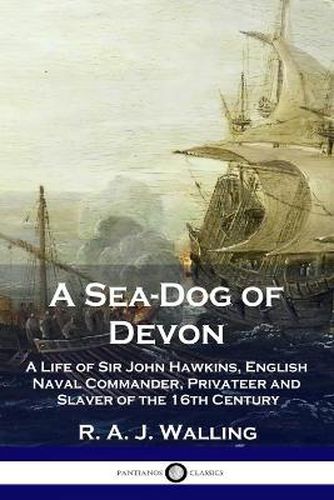Readings Newsletter
Become a Readings Member to make your shopping experience even easier.
Sign in or sign up for free!
You’re not far away from qualifying for FREE standard shipping within Australia
You’ve qualified for FREE standard shipping within Australia
The cart is loading…






This title is printed to order. This book may have been self-published. If so, we cannot guarantee the quality of the content. In the main most books will have gone through the editing process however some may not. We therefore suggest that you be aware of this before ordering this book. If in doubt check either the author or publisher’s details as we are unable to accept any returns unless they are faulty. Please contact us if you have any questions.
Sir John Hawkins was a naval commander and privateer during the Elizabethan era in the 16th century, who explored swathes of the New World amid danger and treachery.
Born to William Hawkins, master of The Great Galley of Henry VIII’s navy, from youth John aspired to a mariner’s career. His father’s reputation as sailor and merchant aided John’s rise, especially when it was clear the younger Hawkins had inherited the vital talents of seamanship and business. John’s first commission from Queen Elizabeth in 1562 was a turning point; returning home with enormous gains, which he built upon in further expeditions, his future in England’s navy was set.
Hawkins was pivotal in planning and commissioning further ships for the English navy, and proved an able administrator. As the Spanish Armada approached in 1588, he served alongside Francis Drake and other commanders - the dispatches Hawkins gave of the enormous fleet are matter-of-fact, noting the immense operational challenges England’s sailors were under.
In modern times, Hawkins is notorious for his dealings in the slave trade, being among the first English slavers. On several journeys he bartered for hundreds of African tribes people, whom he then ferried for sale to plantation owners in the New World. His actions marked the point England joined an inhumane, barbarously lucrative trade, in direct competition with the Spanish and Portuguese.
$9.00 standard shipping within Australia
FREE standard shipping within Australia for orders over $100.00
Express & International shipping calculated at checkout
This title is printed to order. This book may have been self-published. If so, we cannot guarantee the quality of the content. In the main most books will have gone through the editing process however some may not. We therefore suggest that you be aware of this before ordering this book. If in doubt check either the author or publisher’s details as we are unable to accept any returns unless they are faulty. Please contact us if you have any questions.
Sir John Hawkins was a naval commander and privateer during the Elizabethan era in the 16th century, who explored swathes of the New World amid danger and treachery.
Born to William Hawkins, master of The Great Galley of Henry VIII’s navy, from youth John aspired to a mariner’s career. His father’s reputation as sailor and merchant aided John’s rise, especially when it was clear the younger Hawkins had inherited the vital talents of seamanship and business. John’s first commission from Queen Elizabeth in 1562 was a turning point; returning home with enormous gains, which he built upon in further expeditions, his future in England’s navy was set.
Hawkins was pivotal in planning and commissioning further ships for the English navy, and proved an able administrator. As the Spanish Armada approached in 1588, he served alongside Francis Drake and other commanders - the dispatches Hawkins gave of the enormous fleet are matter-of-fact, noting the immense operational challenges England’s sailors were under.
In modern times, Hawkins is notorious for his dealings in the slave trade, being among the first English slavers. On several journeys he bartered for hundreds of African tribes people, whom he then ferried for sale to plantation owners in the New World. His actions marked the point England joined an inhumane, barbarously lucrative trade, in direct competition with the Spanish and Portuguese.